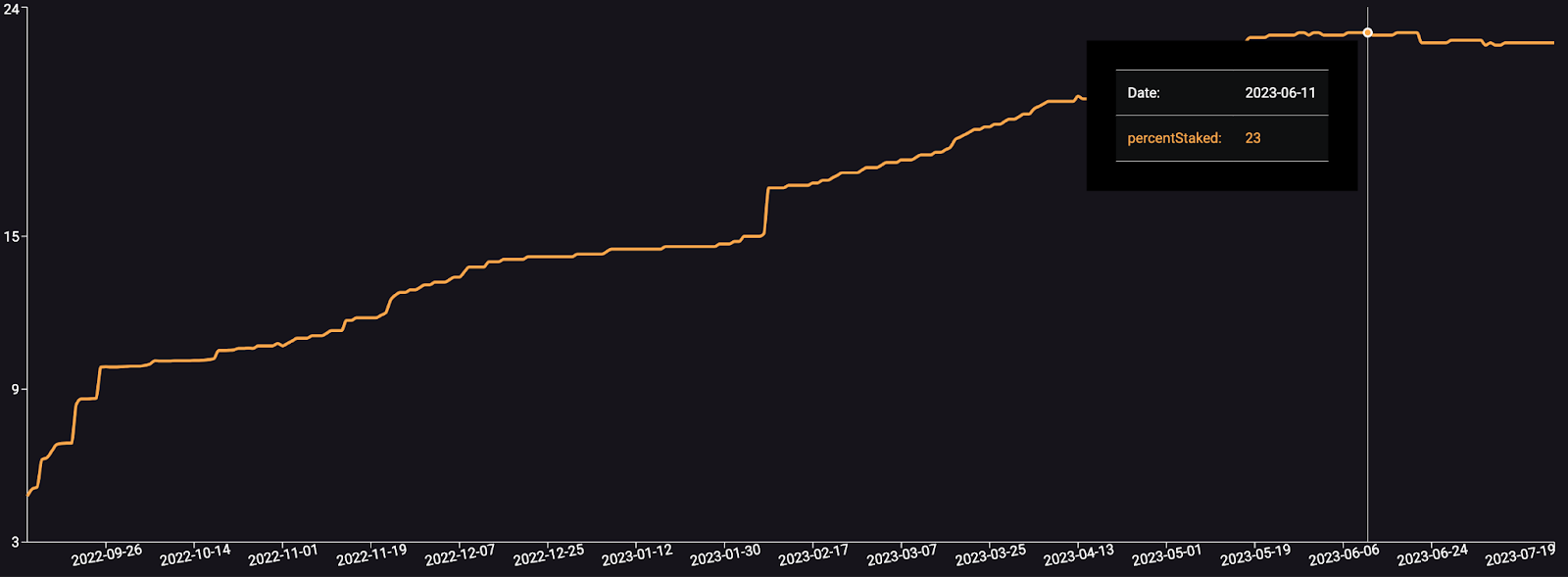Stride, a provider of liquid staking tokens in the Cosmos ecosystem, successfully transitioned to the Cosmos Hub’s Interchain Security (ICS) at block 4616678, which was reached Wednesday at 3:20 pm ET.
The change, initiated following a successful proposal in April, means the entire validator set enforcing consensus on the Stride blockchain switched over to the Cosmos Hub validators all at once. That’s “a large technical feat,” Stride co-founder Aidan Salzmann told Blockworks, akin to the Ethereum Merge, when Ethereum’s consensus switched from proof-of-work to proof-of-stake from one block to the next in September 2022.
Like all Cosmos-based blockchains, Stride uses a delegated proof-of-stake (dPoS) system, governed by holders of its native token, STRD. That hasn’t changed, but unlike most Cosmos chains, Stride’s token is no longer needed for its economic security. That job is now outsourced to the Cosmos Hub and its $2.3 billion in staked ATOM — at 100 times greater value than STRD staked.
The transition required collaboration from independent teams in the Cosmos community, including Informal Systems, which wrote the ICS code, and Neutron, the first blockchain to use it.
Neutron launched in May, using ICS, but Stride is the first chain to swap out its validators while live.
As the early mover in liquid staking on Cosmos, Stride has amassed around 83% of the 3.5 million liquid staked ATOM, according to data from DeFi Llama. About 12% is staked with pStake and 5% with Quicksilver, the most recent of the three to launch.
When an ATOM holder stakes with an LST protocol, they hand over responsibility for selecting Cosmos Hub validators to the protocol, Salzmann noted, calling it a “technical derisking event.”
“Liquid staking is an application that is very ‘close to the metal’ in PoS networks,” he said. “Now that Stride is clearly aligned with the Hub and secured by the Hub validator set, we expect stakers to be less concerned about liquid staking with Stride.”
That’s because in return for the shared security, Cosmos Hub participants independently staking ATOM collectively receive 15% of Stride’s liquid staking rewards, STRD inflationary staking rewards, maximal extractable value (MEV) revenue and transaction fees, according to the now-implemented Cosmos Hub governance proposal.
Impact on STRD token
There are a few consequences of the transition for STRD token holders.
Because staked STRD is no longer needed to secure the chain, the Stride community voted to cut inflationary staking rewards in half.
Why not all the way? “For the sake of continuity,” according to Salzmann.
“This accelerates the process of transitioning from 100% inflationary staking rewards to 100% protocol revenue,” he said.
STRD stakers earn revenue paid in LSTs in addition to the reduced inflation rewards, which accounts for about 3.6% of the current 10.4% APR.
The network’s percent of STRD staked is on the decline, however, having peaked in June at 23%, data from Smart Stake Analytics shows.

Former validators now become “governors” automatically, with responsibilities ranging from providing RPC end points to creating educational content and leading governance discussions — roles validators undertake in other Cosmos networks in addition to providing security.
“One important difference, though, is that STRD delegated to a governor can’t be slashed,” Salzmann said. “Since STRD doesn’t economically secure the chain anymore, [there is] no need for slashing.”
Stride is still ultimately governed by its token holders through their delegations, and the concept of chain sovereignty is a core tenet of the Cosmos ecosystem. But governors have an important role to play, Salzmann said.
“When looking to understand how governors have contributed to the ecosystem, our governance forum, governance channel on Discord, and Twitter are all great places to see how particular governors are helping grow the pie,” he said.
“We believe that the best governors will be awarded proportionally.”
 blockworks.co
blockworks.co
